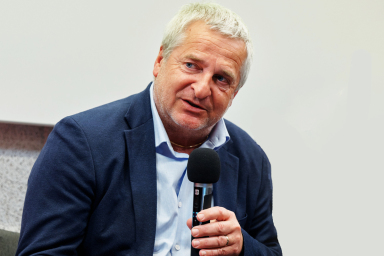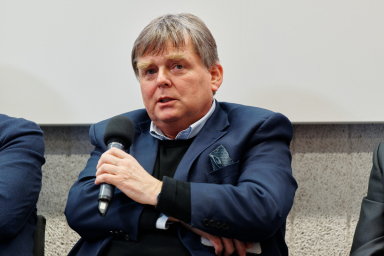Today and tomorrow the Czech Republic selects its 21 out of 720 MEPs. At the same time, the factions and parties into which MEPs are grouped have drawn up election programmes setting out their plans for the next term. And what about health and healthcare? The European People’s Party (EPP) is devoting the most space to the subject, and has also come up with concrete proposals. These include, for example, the creation of European action plans on dementia, cardiovascular disease and mental health.
Although the April Eurobarometer survey showed that health is one of the top priorities for voters – second only to the fight against poverty and social exclusion – this has not been reflected in the election campaigns. Although we saw a big change in the EU’s role in health policy four years ago with the outbreak of the epidemic, with the advent of the war in Ukraine and the economic crisis, the issue has somewhat taken a back seat.
While the election manifestos certainly don’t tell the whole story – as Euractiv points out, even MPs from parties that have not been very active in health in their current manifestos have been very active in this area in the past period – it is possible to get an idea of what the parties would like to achieve from them.
EPP wants more action plans
One of the most ambitious in the field of health is the European People’s Party’s (EPP) electoral programme. „During the last mandate we achieved a major breakthrough in European health policy. It was not just because of the cavid, but even before the pandemic broke out, the Commission had already adopted the EPP Group’s idea and created the European cancer plan. It has been so successful that there are calls for a similar plan for other diseases. That is why the EPP supports the action plan for cardiovascular diseases and also for diseases like Parkinson’s and Alzheimer’s,“ says MEP Peter Liese, EPP health policy spokesman, on his website. And then there is the joint action against the shortage of medicines,“ Liese said.
Health and healthcare is the subject of chapter 3.5 of the Electoral Programme, entitled Our Europe improves people’s lives through innovation in health.
„Reducing health inequalities should be a core mission of the EU. To this end, closing the pay gap is essential to stem the outflow of health professionals from some European regions, especially in rural areas. We want to create a true European Health Union that is ready and equipped to tackle cross-border threats, improve the resilience of our health systems and their interoperability, train the best doctors and nurses, diversify our supply chains and create strategic stockpiles to prevent shortages of medicines and medical devices,“ the programme reads.
Mohlo by vás zajímat
The party’s ambition is also to make the EU a world leader in medical research and innovation, while increasing access to clinical trials. The focus should be on rare childhood diseases such as cancer, for example, which are underfunded. That is why the EPP wants to double the EU’s research budget for the period 2024-2027, while setting a target of four per cent of European GDP dedicated to research and innovation by 2030. Another theme of the party is the potential of big data and artificial intelligence.
In addition to the mentioned European plan against dementia and cardiovascular diseases, the EPP also wants a plan for mental health. „Europeans are increasingly calling for affordable and quality psychological support. That is why we are committed to launching an EU Action Plan on Mental Health to ensure that all Europeans in need have access to adequate psychological support, while removing the stigma often associated with mental illness,“ the programme reads.
PES supports fair prices for medicines
The Group of the Progressive Alliance of Socialists and Democrats (S&D), or the Party of European Socialists (PES), which is part of the group, also has a chapter on access to care in its programme.
‚Universal access to quality health and social care is a fundamental right. Covid-19 demonstrated the essential contribution of the healthcare sector to society and the importance of European cooperation against health threats,“ the programme reads.
Specifically, the party wants to defend the public health sector, which creates quality jobs, and advocates a European Health Union that will manage cross-border pandemic response issues and support public health care at national level. The PES also calls for a strong European mental health strategy.
„We will introduce fair and transparent pricing of medicines to prevent shortages and promote timely access to treatment and innovation, including for rare diseases. We support initiatives for joint European public research on vaccines, life-saving medicines and antimicrobial resistance,“ the programme adds.
ALDE supports digitalisation
The party Alliance of Liberals and Democrats for Europe (ALDE), which is part of the Renew Europe faction, is less focused on health and healthcare in its programme. However, as Euractiv points out, a number of ALDE MEPs who may well return to the Parliament have been very active on health issues in the past period.
The programme mentions digitalisation in health, reproductive rights and the promotion of skills for professionals, including those in the health sector. „We support professional programmes that will rapidly upskill key professions in areas such as manufacturing, education, cyber security, health and agriculture, using digital know-how to accelerate the digital transition and increase competitiveness,“ the programme states.
Greens: Down with inequality
The European Green Party’s programme emphasises in particular the links between the environment and human health and focuses on eliminating inequalities.
Their aim in the area of health is to provide universal health insurance for everyone in Europe. „We will work to eliminate health inequalities and guarantee access to affordable medicines and treatments, including for cancer and rare diseases, in ways that are inclusive for all, especially the most vulnerable and racially disadvantaged communities. No one in Europe should feel forced to move to another country because of unmet healthcare needs. European legislation on universal health coverage will require all Member States to provide this fundamental right,“ the programme says.
The Greens also want to focus on the lessons of covid. They say the EU should set up a health group to cooperate on health emergencies and disaster response.
The Greens also aim to improve the quality of food. „Many key risk factors for non-communicable diseases such as cancer are about diet. Our vision is to connect consumers and producers, empower people to make informed choices and ensure farmers get a fair price. We will establish the right to food as a principle in EU legislation, leading to dedicated social security mechanisms at national level to guarantee access to healthy food while supporting local supply chains,“ the Greens plan.
The European Conservatives and Reformists (ECR) do not mention health in their programme and, according to Euractiv, consider health largely a national issue. However, this is at odds with the way ECR MEPs have so far approached health proposals. In fact, unlike the far-right Identity and Democracy (ID) group, they have engaged and supported almost all activities in the area of health. The key question will therefore be whether the more right-wing representation will be reluctant to support the health proposals put forward to the next Parliament.
-mk-







